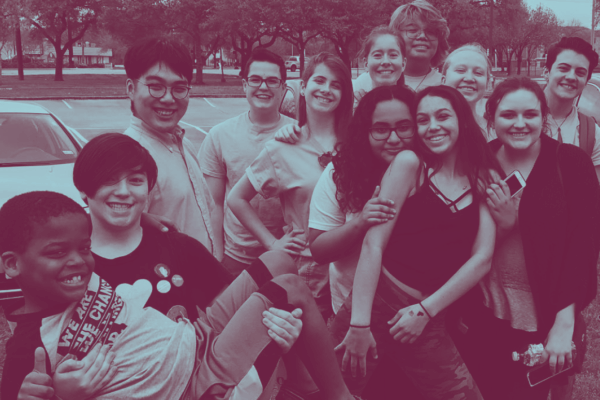This content is intended to serve as general information; it is not legal advice nor intended as legal advice.
What is a Gender and Sexuality Alliance?
Genders and Sexualities Alliances (formerly known as Gay-Straight Alliances), or GSAs, are student-led and student-organized school clubs that aim to create a safe, welcoming, and accepting school environment for all youth, regardless of sexual orientation or gender identity. GSAs provide a supportive environment for lesbian, gay, bisexual, transgender, and gender non-conforming (LGBTQ) students, as well as those who are perceived by others to be LGBTQ, are questioning their identity, have LGBTQ friends or family members, or just care about LGBTQ issues.
Why should I start a GSA at my school?
GSAs help make schools safer for all students by providing support, educating others in your school about LGBTQ issues, and engaging in awareness activities like the national Day of Silence. GSAs also allow LGBTQ and straight students to work together to take on issues that affect all students, including harassment and discrimination based on sexual orientation, gender identity, and gender expression. Research has shown that LGBTQ students hear fewer homophobic slurs, experience less harassment, have better attendance, and feel safer at schools that have GSAs. Like any club, what a GSA does is up to its members, but it often includes things like pitching in on community service projects and getting together for social activities.
Do I have the right to start a GSA at my school?
School administrators are sometimes hesitant about allowing students to start GSAs, but federal law guarantees that students at public high schools have the right to do so. Under the law, there are two types of clubs in public high schools: curricular clubs (those that relate directly to things that are taught in the school, like the Math Club), and non-curricular clubs (those that don’t relate directly to things that are taught in the school, such as the Key Club or Chess Club). The federal Equal Access Act says that if a public high school allows students to form any non-curricular clubs at all, then it must allow students to form any non-curricular club they want — and it also has to treat all non-curricular clubs equally. If you’re trying to start a GSA at your school and your administration tries to stop you, or if doesn’t allow the GSA to do things that it lets other non-curricular clubs do, keep reading for tips on what to do. You may need to contact the ACLU of Texas for further guidance.
How do I start a GSA at my school?
Below are some links to help you with the basic steps to starting a GSA at your school. Chances are you’ll be able to start your GSA with no problems — after all, over 4,000 GSAs already exist, including in every state in the nation. Sometimes, though, administrators, parents, or other students may try to stand in the way of GSAs. In case that happens at your school, we’re including information on how to handle obstacles you may run into.
- How to Start a GSA video: A short online video outlining the steps students can take to start a GSA at any public school.
- How to Start a GSA guide: A how-to guide on starting a GSA at your school. A printable PDF version is available.
- GSA Mission Statement Examples: Your school may require you to write a mission statement for your club. Here are a few good examples from GSA clubs around the U.S.
- U.S. Department of Education guidance on GSA clubs and the Equal Access Act: An open letter from the federal government about students’ right to form GSAs in public schools. The letter includes studies and case law and makes it clear that public schools are legally required to allow students to start GSAs and schools must treat GSAs the same as any other clubs. There is also another document with more legal citations that goes with it; you should include it if you give this letter to your school.
Stay Informed
Sign up to be the first to hear about how to take action.
By completing this form, I agree to receive occasional emails per the terms of the ACLU’s privacy statement.
By completing this form, I agree to receive occasional emails per the terms of the ACLU’s privacy statement.

